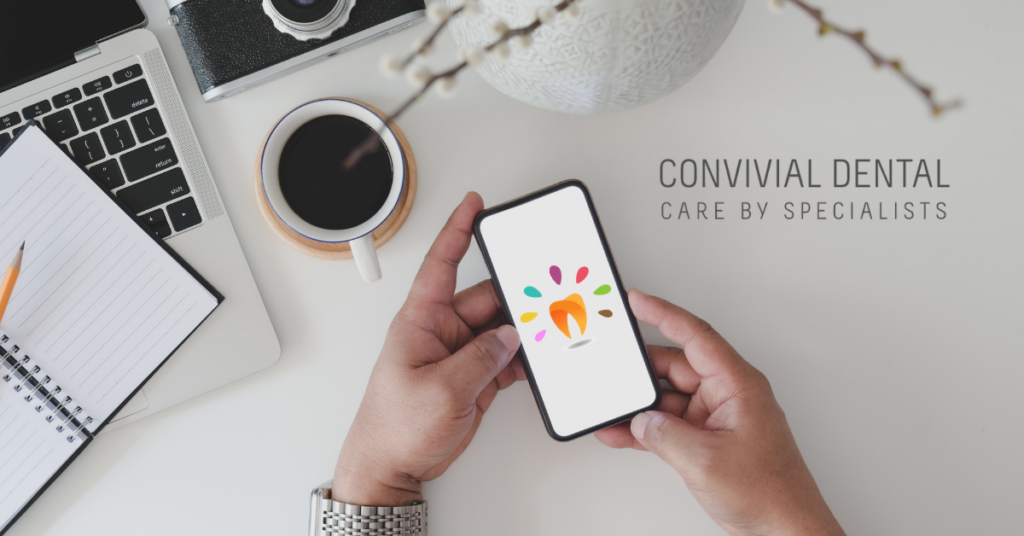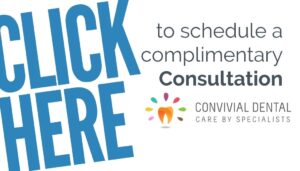
Telehealth doctor visits are becoming increasingly common and convenient. At Convivial Dental we are happy to provide complementary Virtual Consultations to Chestnut Hill and our surrounding communities. If you are interested in Invisalign or braces, here’s what you need to know about getting your orthodontic treatment started from the comfort of your home.
What are Virtual Consultations?
Virtual consultations offer a convenient and easy way to learn about your orthodontic treatment options from the comfort of your home and are available to patients of all ages. You can get started right away without having to place a call, schedule an appointment, or make a trip to the doctor’s office. This has become even more important during the COVID-19 pandemic where reducing unnecessary trips can help keep you and your community safe. During your virtual consultation, you will receive an assessment of your smile and treatment options.
How can I get started with my virtual consultation?
Simply visit our Appointment Request page (https://www.convivialdental.com/appointment-request) to begin. Answer a few questions and any details you would like us to know. Submit the form and we will be in touch right away! It’s quick and easy to do—the whole process will only take you a few minutes.
What happens after I submit the form on the Appointment Request Page?
A member of our amazing team will reach out to you and find the perfect day and time for your virtual visit and answer any questions you may have.
I’ve received my smile assessment from Dr. Cartsos and want to get started on treatment—what’s next?
At the end of your Virtual Consultation, Dr. Cartsos will put you in contact with our treatment coordinator. Our treatment coordinator can answer any follow up questions and schedule you for a digital scan using our state-of-the-art iTero 5-D scanner.
I loved my virtual consultation. Do you also offer virtual appointments throughout treatment?
Absolutely, in many cases after your initial visit we can monitor your progress and give recommendations remotely. We provide our patients with a Virtual Care kit to ensure they have everything they need at home to keep their treatment on track and make our virtual appointments even easier. We can always schedule an office visit for anything that needs to be addressed in person. At Convivial Dental we offer virtual appointments mid-treatment to monitor treatment progress with a HIPPA safe virtual platform called DOXY ME.
What COVID-19 safety precautions does your office take for in-person office visits?
The safety and well-being of our patients, staff and community is a top priority for us. We protect our team and our patients with the latest recommended personal protective equipment (PPE). We have all of the latest sterilization protocols in place to ensure that our facilities and clinics are ready for your arrival. All patients and staff members are screened prior to visiting the office and are required to wear approved face masks.
Are you ready to get started on your new smile? Click below to begin your virtual consultation now!

Care You Can Trust:
Dr. Cartsos is a leading orthodontist and TOP GOLD PLUS TIER INVISALIGN PROVIDER in Chestnut Hill and surrounding Boston Area. Dr. Cartsos and her team utilize state-of-the-art treatments and technologies to provide the most effective, safe, and comfortable experience for their patients.
With over 20 years of clinical and academic experience, Dr. Cartsos has the ability to customize orthodontic treatment and cater to each person’s needs and life-styles with various modes of treatments. We love working with children of every age and enjoy working with adults as well.
In addition to a full time private practice, Dr. Cartsos serves as Associate Professor of Orthodontics at Tufts University on a part-time basis.
Dr. Cartsos is a co-founding member of the Tufts Medical Center Cleft Lip & Palate- Craniofacial team adding orthodontic services to this multidisciplinary team to address complex cases and can contribute to life changing improvements. For the last 10 years, her passion and mission has been to contribute my orthodontic services to this multidisciplinary team to address complex cases. She often works in conjunction with Pediatric ENT specialists, Plastic Surgeons, Oral Surgeons, Pediatric Dentists, Geneticists, Speech pathologists, Audiologists and Nutrition specialists to provide total rehabilitation of the face, teeth and jaws.
EDUCATION
Certificate in Orthodontics – Tufts University School of Dental Medicine
Master’s Degree in Orthodontics (Decision Analysis) – Tufts University
Doctorate of Dental Medicine – Tufts University School of Dental Medicine
MEMBERSHIPS/ASSOCIATIONS
American Association of Orthodontists
American Dental Association
Massachusetts Dental Society
Massachusetts Association of Orthodontists (Board member)
Northeastern Society of Orthodontists
American Cleft Palate - Craniofacial Association
PROFESSIONAL EXPERIENCE
Orthodontist, Private Practice (since 1996)
Associate Professor of Orthodontics, Tufts University (since 2005)
Director of Graduate Orthodontics, Tufts University
Course Director, Orthognathic Surgery, Tufts University
Craniofacial & Cleft Palate Team, Tufts Medical Center
Former President of Tufts Orthodontic Association
Premier Preferred Invisalign® Provider
Certified Incognito™ Provider
PERSONAL
She is married to Dr. Ethan Zavras’ our pediatric dentist and they share two teenage sons that keep them very busy. They have an eight-year-old Dachshund, Daphne. Her personal interests include travel, tennis, and skiing.











